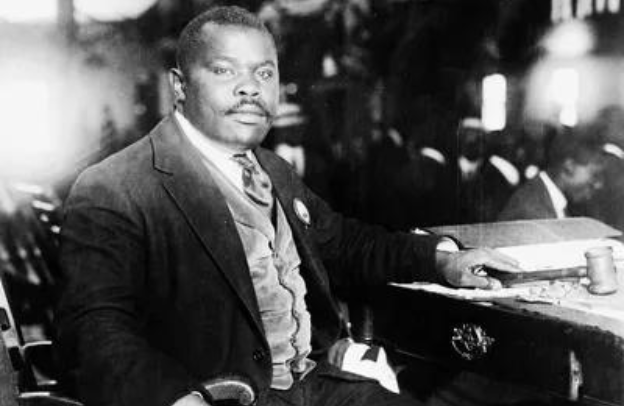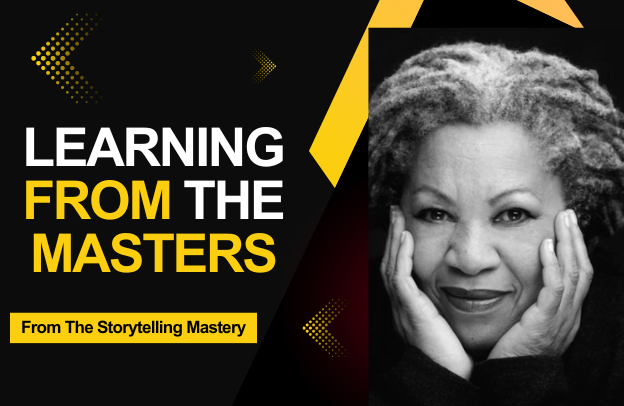5 Key Self-Improvement Lessons From Marcus Garvey

Born August 17, 1887, in St. Ann’s Bay, Jamaica, and died June 10, 1940, in London, England, Marcus Garvey was a charismatic leader who organized the first important American Black nationalist movement between 1919 to 1926, in Harlem, New York City.
Want to learn more about storytelling? Start by downloading the first chapter of The Storytelling Mastery.
Largely self-taught, Garvey attended school in Jamaica until he was 14. Despite his limited formal education, Garvey’s remarkable oratory skills, compelling vision for Black self-reliance, and unwavering commitment to the upliftment of the African diaspora captivated and inspired millions.
He founded the Universal Negro Improvement Association (UNIA) in 1914, which rapidly grew into a global movement advocating for African unity and economic independence.
His charismatic leadership was characterized by his ability to galvanize Black communities, fostering a sense of pride and identity through initiatives like the Black Star Line, a shipping company aimed at facilitating trade and travel among African people globally.
Garvey’s legacy as a pioneer of Black nationalism and his influence on subsequent civil rights movements underscore his enduring impact as a visionary and motivational figure in the struggle for racial equality and empowerment.
Now, pay attention to this: at the heart of Garvey’s mission was the importance of self-improvement among the African people because no one can rise beyond his level of awareness and knowledge.
That is why words like “the knowledge of oneself” and “self-education” were prevalent in the works of Marcus Garvey. That also means you simply cannot complain about that past and say things like “They didn’t teach you”.
Well, never forget that knowledge is available to everyone today. So, that you can teach yourself whatever you want. Now, let’s briefly touch on this before we get into the 5 lessons from Marcus Garvey.
See also The Life & Legacy Of Marcuse Garvey By George Goddard
The importance of self-improvement
You need to love self-improvement because it equips you with the essential skills, resilience, and determination to transform aspirations into reality. It enables you to set realistic goals and maintain persistence and consistency, including viewing setbacks as valuable lessons for continuous growth.
What that translates to is that by continually striving to better ourselves, we enhance our skills, broaden our knowledge, and refine our character, which not only benefits our personal and professional lives but also positively impacts our communities and society at large.
This is exactly what Marcus Garvey did which is why we are talking about him today. By refining himself even though he didn’t have all the bells and whistles of an academic background, he eventually became a source of inspiration to millions of people across the world.
Can you challenge yourself by delving into helpful knowledge that can elevate your soul? I think you should. Self-improvement drives us to set and achieve goals, adapt to changing circumstances, and overcome obstacles with greater ease and confidence.
It helps us cultivate a mindset of lifelong learning and adaptability, which is crucial in an ever-evolving world.
So start today, become intentional, and let the pursuit of self-improvement lead to a more fulfilling and meaningful life.
With that said, let’s explore the 5 Marcus Garvey key Lessons to improve yourself. Make sure to pay attention to every one of them.
Lesson 1: From ignorance to intelligence
“Therefore, remove yourself as far as possible from ignorance and seek as far as possible to be intelligent.”
There is no doubt that in our modern world, the wisdom of Marcus Garvey continues to resonate with profound clarity and relevance.
In an age where information is more accessible than ever before, the pursuit of intelligence should not be seen as merely about amassing knowledge but about cultivating a deeper understanding of ourselves and the world around us.
Garvey’s words should therefore remind us that ignorance is a barrier not only to personal growth but to the collective progress of society. To truly remove ourselves from ignorance, we must actively engage in continuous learning, critical thinking, and open-minded exploration of diverse perspectives.
See also Learning How To Position Yourself On LinkedIn With Alado Ngozi
Look around you. What can you learn from your environment and the experiences you have been opportune to have? These experiences might even be bad ones, but what lessons do you draw from them to make you a better version of yourself? That is essentially what we are talking about here.
Applying Garvey’s principle today means embracing a lifelong journey of intellectual and personal development. It involves recognizing that intelligence is not a static trait but a dynamic process that requires dedication and effort.
By seeking intelligence, we commit to nurturing curiosity, fostering empathy, and challenging our preconceived notions. Never underestimate that.
And always remember that this path of self-improvement calls for discipline and a willingness to confront uncomfortable truths, both within ourselves and in the broader societal context.
Note also that as we strive to distance ourselves from ignorance, we build the foundation for a more enlightened and equitable world. This is a better way to fulfill Garvey’s vision of empowered individuals who can contribute meaningfully to the advancement of humanity.
Lesson 2: Honor your history and heritage
“We must canonize our own saints, create our own martyrs, and elevate to positions of fame and honor Black men and women who have made their distinct contributions to our racial history … I am the equal of any white man; I want you to feel the same way.”
Now, here is a question for you. Do you feel that way? I mean, are you getting the message? This sentiment, deeply rooted in the principle of self-empowerment, encourages us to celebrate and elevate figures within our communities who have demonstrated extraordinary courage, innovation, and leadership.
If you come to AClasses Academy, you will see that we have a project we call “Life and Legacy”. That is essentially in line with this. We are intentionally celebrating individuals of African descent who have shaped our community and defined the legacy we have today.
It is our duty to celebrate these individuals and make sure that their legacy lives on in our own time. Why and how should we do that?
Well, by creating our own martyrs and heroes, we not only pay homage to their legacies but also forge a sense of identity and pride that transcends generations. This act of canonization is not merely about veneration; it is about reclaiming our narrative, recognizing the inherent worth and dignity of our contributions, and inspiring future generations to continue this legacy of excellence and resilience.
Garvey’s assertion, “I am the equal of any white man” underscores the imperative of self-improvement through the recognition of one’s own value and potential.
This declaration is a clarion call for self-empowerment, urging individuals to internalize a sense of equality and self-worth that is crucial for personal and communal advancement. Do not be casual about this but be intentional.
As part of this storytelling series, (The Storytelling Mastery), every 14 days, we organize a LinkedIn audio live event where we talk about different topics on how to leverage the power of storytelling in the African diaspora community.
Sometimes, the conversation is emotional and deep, but we are very intentional about it because this is our story and we cannot delegate it to other people to tell us.
See also The Power of Storytelling in Business Communication: Join the LinkedIn Event Today!
In a contemporary context, Garvey’s principle can translate into actionable steps toward self-betterment: embracing education, cultivating skills, fostering entrepreneurship, and actively participating in the socio-political discourse.
By instilling a belief in our equal standing and capabilities, we will dismantle the psychological barriers imposed by centuries of systemic oppression and pave the way for a future where our achievements are recognized and celebrated on equal footing.
So, it’s up to us to uphold this ethos by Garvey, so it can empower us to build a society that honors its diverse histories and helps elevate every individual to their rightful place of dignity and respect.
Lesson 3: Feel the pride in your skin
“The Black skin is not a badge of shame, but rather a glorious symbol of national greatness.”
In a world where societal structures have often marginalized Black communities, Garvey’s words serve as a clear call to recognize and celebrate the rich cultural legacy and historical achievements that define African greatness.
This recognition is not merely an act of defiance against oppression but a reclamation of a narrative that has been obscured by centuries of prejudice.
By viewing Black skin as a symbol of greatness, individuals can draw strength from their ancestry and leverage this pride as a cornerstone for personal growth and self-improvement.
So, wherever you find yourself, consider embracing this perspective to encourage a shift from internalized shame to a celebration of one’s identity. This is crucial also for psychological and emotional well-being.
Another advantage of this mindset is that it fosters resilience, motivating individuals to pursue excellence in their personal and professional lives. It also helps to propel communities for higher educational achievements, entrepreneurial endeavors, and robust civic engagement because they feel a true sense of belonging.
Garvey’s wisdom, therefore, serves as a timeless guide, reminding us that true self-improvement begins with the acknowledgment and celebration of one’s inherent worth and cultural heritage.
Lesson 4: Intelligence rules the world
Marcus Garvey’s assertion, “Intelligence rules the world, ignorance carries the burden,” perfectly encapsulates the transformative power of knowledge and the debilitating weight of ignorance.
In a society driven by information and innovation, it is imperative to see intelligence as the key to unlocking opportunities and navigating the complexities of modern life. Garvey’s wisdom, therefore, underscores the importance of education and lifelong learning as fundamental pillars for personal and communal advancement.
What that means is that by cultivating intelligence, individuals not only enhance their own potential but also contribute to the collective progress of their communities.
Again, this was what Garvey did, himself. He didn’t have much knowledge of the world when he left Jamaica as a young man, but he vigorously sought information and self-education to refine himself and that knowledge was not for him alone but for the entire African diaspora community and any lover of freedom for that matter.
See also Harnessing the Power of African Diaspora Heritage for Positive Change
In this light, self-improvement is intrinsically linked to the pursuit of knowledge, which empowers individuals to make informed decisions, solve problems creatively, and lead with vision and empathy.
Conversely, Garvey’s warning about the burden of ignorance highlights the risks of remaining uninformed and disengaged. Ignorance, in this context, is not merely a lack of knowledge but a state of passivity that hinders growth and perpetuates disadvantage.
Now, imagine Garvey’s key message which was specifically about the liberation of African people, home and abroad. However, his refined mindset made it possible for him to do business even across cultural and ethnic backgrounds.
So, don’t limit yourself, and don’t allow ignorance to hinder you from accessing the right information or engaging with the people who can help you get to the next level.
Those who carry the burden of ignorance often find themselves marginalized, their potential unrealized, and their voices unheard. To overcome this, Garvey’s message advocates for an active rejection of complacency in favor of a relentless quest for understanding and enlightenment.
What this also means is that the journey toward intelligence is not solely about academic achievement but also about developing critical thinking, cultural awareness, and emotional intelligence.
By embracing this path, individuals can shed the burden of ignorance and ascend to roles of influence and leadership, ultimately shaping a more just and informed world.
Garvey’s insight thus serves as an important call to action, reminding us that true self-improvement lies in the empowerment that comes from knowledge and the courage to seek it continually.
Lesson 5: build up confidence in yourself
“If you haven’t confidence in self, you are twice defeated in the race of life. With confidence, you have won even before you have started.”
This is a fundamental lesson. In the journey of self-improvement, confidence can act both as the foundation and the catalyst for achieving one’s goals. Without it, individuals are often paralyzed by self-doubt and fear, unable to fully engage with the opportunities before them.
Garvey’s wisdom highlights that the lack of self-confidence is a defeat that precedes any external challenge, undermining potential even before any action is taken. To counter this, cultivating a deep-seated confidence is essential, enabling individuals to approach life’s challenges with resilience and a positive mindset. This is what helps to transform obstacles into stepping stones toward success.
The point is to know exactly what you want because when you do and you are ready to pay the price for what you are shooting for, any obstacle on your way can be your way or your stepping stone.
No one can deny that in today’s fast-paced and competitive world, the importance of confidence is more relevant than ever. It is the inner assurance that fuels ambition fosters innovation, and drives perseverance.
Garvey’s insight reminds us that with self-confidence, one possesses an intrinsic advantage. self-confidence instills a sense of capability and determination that propels individuals forward, even in the face of adversity. Trust you; you need that. We all do.
Note that by confidence we are not talking about arrogance or overestimation of one’s abilities, but a realistic and affirming belief in one’s potential to learn, grow, and achieve objectives.
By embracing this principle, individuals can overcome the psychological barriers that impede progress and can harness their inner strength to pursue their aspirations vigorously. The term vigorous here implies that you are intentionally and you are investing enough energy in your mission.
So see these lessons from Marcus Garvey’s as an encouragement to build and maintain your confidence as a crucial element of self-improvement. Doing so will ensure that you enter every endeavor with the conviction that you are already on the path to victory. That is where you need to be.
Want to learn more about storytelling? Start by downloading the first chapter of The Storytelling Mastery.





